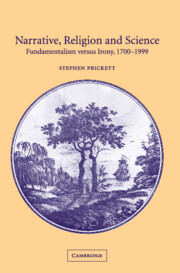Book contents
- Frontmatter
- Contents
- Acknowledgements
- Introduction: Arthur Dent, Screwtape and the mysteries of story-telling
- 1 Postmodernism, grand narratives and just-so stories
- 2 Newton and Kissinger: Science as irony?
- 3 Learning to say ‘I’: Literature and subjectivity
- 4 Reconstructing religion: Fragmentation, typology and symbolism
- 5 The ache in the missing limb: Language, truth and presence
- 6 Twentieth-century fundamentalisms: Theology, truth and irony
- 7 Science and religion: Language, metaphor and consilience
- Concluding conversational postscript: The tomb of Napoleon
- Bibliography
- Index
2 - Newton and Kissinger: Science as irony?
Published online by Cambridge University Press: 12 November 2009
- Frontmatter
- Contents
- Acknowledgements
- Introduction: Arthur Dent, Screwtape and the mysteries of story-telling
- 1 Postmodernism, grand narratives and just-so stories
- 2 Newton and Kissinger: Science as irony?
- 3 Learning to say ‘I’: Literature and subjectivity
- 4 Reconstructing religion: Fragmentation, typology and symbolism
- 5 The ache in the missing limb: Language, truth and presence
- 6 Twentieth-century fundamentalisms: Theology, truth and irony
- 7 Science and religion: Language, metaphor and consilience
- Concluding conversational postscript: The tomb of Napoleon
- Bibliography
- Index
Summary
SAID, KISSINGER AND NEWTON
In his book, American Foreign Policy, Henry Kissinger, Nixon's Secretary of State in the 1970s, compares what he sees as the Western attitude to the world with those of the developing countries. The West, he writes, ‘is deeply committed to the notion that the real world is external to the observer, that knowledge consists of recording and classifying data – the more accurately the better’. Citing as an example the Newtonian revolution, which has not taken place in the developing world, Kissinger argues that ‘Cultures which escaped the early impact of Newtonian thinking have retained the essentially pre-Newtonian view that the real world is almost completely internal to the observer.’ Consequently, he adds, ‘empirical reality has a much [sic] different significance for many of the new countries than for the West because in a certain sense they never went through the process of discovering it’.
Edward Said, the Palestinian–American critic, quotes this passage in his book, Orientalism, an angry indictment of the way in which Europe (or, what the naturalized American, Kissinger, would call the ‘West’) has constructed its Eastern opposite: the ‘Orient’. Said's book deservedly attracted a lot of critical attention when it was first published in 1978, but I do not recall any specific comment on this particular piece of intertextuality – which is a pity, because it is worthy of some scrutiny.
- Type
- Chapter
- Information
- Narrative, Religion and ScienceFundamentalism versus Irony, 1700–1999, pp. 54 - 93Publisher: Cambridge University PressPrint publication year: 2002



